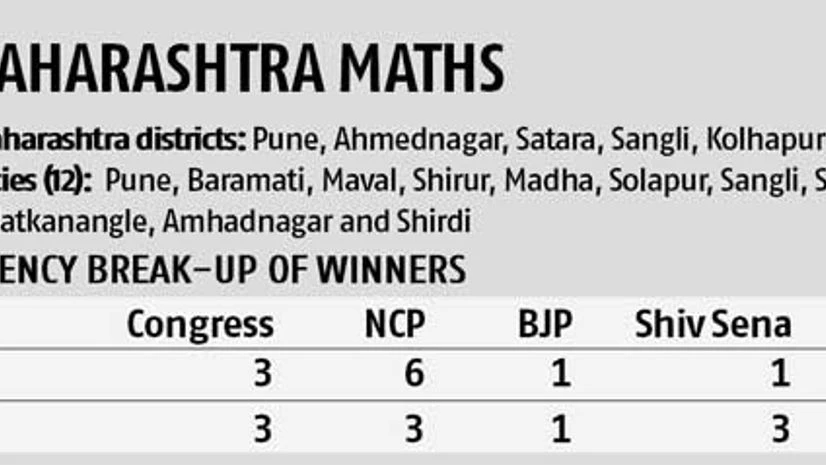Western Maharashtra, the traditional pocket-borough of sugar barons, is showing signs of change, political as well as aspirational. Traditionally, this region, comprising Pune, Baramati and Shirur, has been the stronghold of Nationalist Congress Party (NCP) chief and Union Agriculture Minister Sharad Pawar, as have been Ahmednagar, Satara, Sangli, Kolhapur and Solapur.
A lot is at stake in this region, a Maratha stronghold. Western Maharashtra has accounted for four state chief ministers -incumbent Prithviraj Chavan (Satara), Yashvanrao Chavan (Karhad), Vasantdada Patil (Sangli) and Pawar (Baramati).
The region also accounts for 35 per cent of India's sugar production. According to official data, in 2012-13, there were 105 sugar co-operative factories and 55 private sugar factories in the region; these crushed 70 million tonnes of sugarcane, producing about 800 quintals of sugar. The annual turnover of these sugar factories was about Rs 35,000 crore and their contribution to the state and central government coffers was Rs 1,500-2,000 crore, by way of excise duty and other taxes.
For long, the Congress and the NCP have benefited from control of sugar factories in this region. For crushing, farmers growing sugar cane depend on factories and, therefore, are loyal to the parties that control these units. Several leaders contesting these elections are board members and shareholders of these sugar co-operatives, as well as owners of private sugar factories.
Through the years, poor management of cooperative sugar mills has led to resentment among cane growers. Now, the young population seems to be moving away from the Maratha caste-oriented politics of the Congress and the NCP. While issues such as rising unemployment and migration of youngsters for education and jobs to cities such as Pune remain ignored, political empires and their internal rivalry is the only issue in this cash-rich region.
Traditionally a Congress and NCP bastion, it seems the tide is changing in western Maharashtra.
In western Maharashtra, where voting concluded on April 17, the chances of a rout for the United Progressive Alliance are stronger than ever, as is evident from the scheme of things in the state's cultural capital, Pune. The city saw the Bharatiya Janata Party (BJP)'s prime ministerial candidate Narendra Modi, as well as Congress counterpart Rahul Gandhi, addressing rallies. At his rally, Modi targeted Sharad Pawar's inability to address the problems of farmers, who suffered steep losses due to the recent unseasonal rains and hailstorms.
The BJP and the Shiv Sena, its long-standing ally, have already made inroads here. They have been supported by regional parties such as Swabhimani Shetkari Sanghatna (a farmer outfit), the Republican Party of India and the Rashtriya Samaj Party (representing nomadic tribes).
In the 2004 Lok Sabha elections, the Congress and the NCP won nine of the 12 seats in here, while the Shiv Sena and the BJP bagged a seat each. One seat went the Republican Party of India's way. In 2009, the Congress-NCP combine's tally fell to six, while the National Democratic Alliance (NDA) parties won four. The numbers point to a clear trend of voters moving away from the Congress-NCP combine. A similar trend was observed in the state Assembly elections held in October 2009.
This year, the woes of the Congress-NCP have been accentuated by other factors, too. Raju Shetty, the farmer leader who won the Hatkanangle seat in Kolhapur district, has joined the NDA, while Sadashiv Mandlik, who won as an independent candidate from Kolhapur city, has secured a Shiv Sena ticket for his son.
Though Sharad Pawar these elections, he is actively campaigning for daughter Supriya Sule, who is contesting from the Baramati seat. Scam-tainted Congressman Suresh Kalmadi isn't contesting the Congress-stronghold of Pune, where the fight is between the BJP's Anil Shirole, the Congress's Vishwajeet Kadam and the Maharashtra Navnirman Sena's Deepak Paygude.
For the NCP, losing both seats in Kolhapur district is akin to the Congress losing in Amethi or Rae Bareli, its strongholds.
Also, the dalit vote appears to be tilting in favour of the NDA, another key reason for what seem the Congress-NCP's dismal fortunes.
Districts such as Ahmednagar, Sangli, Satara and Kolhapur have always supported the Congress-NCP combine. But the BJP winning a seat in Ahmednagar or Solapur and the Shiv Sena grabbing seats in Kolhapur and Pune are definite signs of the Congress-NCP's waning clout over the traditional Maratha vote base.
Political observers believe the BJP and its allies will make things bitter for the UPA in the country's sugar bowl.
With inputs from Shivani Shinde Nadhe
Disclaimer: These are personal views of the writer. They do not necessarily reflect the opinion of www.business-standard.com or the Business Standard newspaper

)
